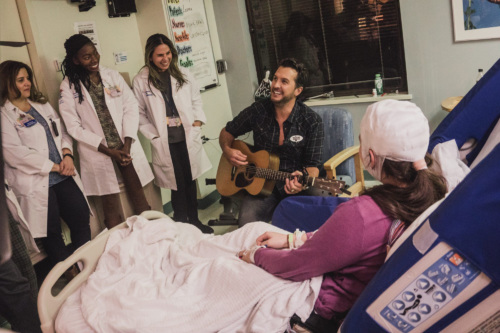
Undeniable Benefits of Live Music
Research has shown, time and time again, that music heals. Music has the power to improve blood pressure, manage stress, alleviate pain, and improve overall mood. Not only has this been found in study after study, but we’ve seen it first-hand from our programs. Here are just four examples from our programs that show the proven effects of music on those who need it most.
1. Music can improve blood pressure
Studies have shown that music can have a measurable impact on patients, specifically on improving blood pressure. As mentioned in The Telegraph, “Research presented to the British Cardiovascular Society (BCS) conference in Manchester found that listening to music with a repeated 10-second rhythm coincided with a fall in blood pressure, reducing the heart rate.”
This family saw this happen first-hand when our volunteers visited their bedside. The patient’s mother shared with us what happened as soon as the Volunteer Musician started playing:
Suddenly all the tension we had been feeling had slipped away for that short time. Not only my son, but all of us were a little more relaxed. And my son smiled for the first time in over a week! That was a great feeling.
2. Music can help manage stress
You may have felt the calming effects of music in your own life, but music’s ability to regulate stress is essential for patients and caregivers in the hospital. In a study published in the American Psychological Association, researchers found that “Music improves the body’s immune system function and reduces stress. Listening to music was also found to be more effective than prescription drugs in reducing anxiety before surgery”
Scout is a patient at Phoenix Children’s Hospital. After being in a coma from a serious car accident last year, his body had to relearn its basic functions. After fighting for his life following the accident, he found the strength he needed to keep fighting through his recovery in Rachel Platten’s smash hit “Fight Song.”
Watch below as Scout and his mother meet Rachel during a special Musicians On Call Virtual program and share a few personalized lyrics that helped them get through..
3. Music can help alleviate pain
For those in the hospital, any relief from pain is important to the healing process. One surprising tool to help manage pain is music! In a study published by Acta Paediatr, infants in the NICU were introduced to music during their stay. “After music, the number of apnoeas and oxygen desaturations was significantly reduced on all three days, and the number of bradycardia episodes on day one. Pain scores significantly improved after music on all 3 days.”
Need further evidence? Just ask Teressa, who had an MOC volunteer visit her bedside as her pain was at a high level.
The gentleman had an amazing voice and had me smiling the entire time. I forgot that I was about to push my pain pump when they entered my room!
4. Music can improve overall mood
At Musicians On Call, we say we add a “dose of joy” to the healthcare environment. That isn’t just a tagline In a study conducted by the University College of London in 2020, those that engaged with music for just 30 minutes a day had “lower reported rates of depression and anxiety and greater life satisfaction.”
Sometimes the transformation in a patient’s mood is the best part of the visit. During this visit in 2017, Kalie Shorr entered the room to find a young patient in tears. Once the music started playing, he immediately lit up as the stress of being in the hospital melted away. We were so grateful to capture this moment with the images below.


Learn more about the healing power of music here.